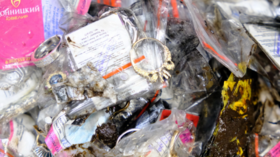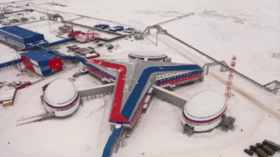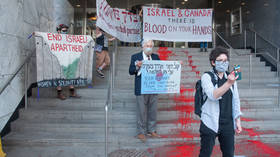Investor from hell? Swiss mogul holding Russian town hostage by clinging onto major factory despite court rulings, locals say
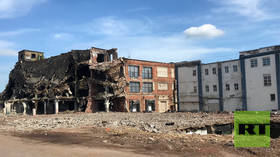
For years now, the little town of Lyubertsy, just outside of Moscow, has been the unlikely setting for an international legal battle over the fate of a former Soviet factory, which local residents say is blighting their lives.
RT talked to law enforcement officials, lawyers and the town’s mayor to unravel the mystery of how Adolf Gast, a Swiss national, has been able to build a booming business on the site of the A. V. Ukhtomsky Agricultural Machinery Plant, despite reported irregularities in the paperwork and dozens of court injunctions against it. The local administration is working to take the premises back under its control, and it says there is no lease on the land the buildings stand on, with Gast said to owe hundreds of millions of rubles for its use. Despite that, a hive of businesses, offices, moderately-priced hostels, and overnight shelters for migrants have sprung up, apparently in violation of fire safety requirements, bringing cash in to his dilapidated empire.
The complex, spread across several football fields of land, is easy to get to – in a prime location in the very center of Lyubertsy, right off the main street. From the hustle and bustle, it is impossible not to spot the industrial ruins. Locals say you could shoot a war movie here without spending a dime on set design, since many of the run-down buildings of the plant this town was originally built around, once well-known across the USSR, have long since fallen into disrepair.
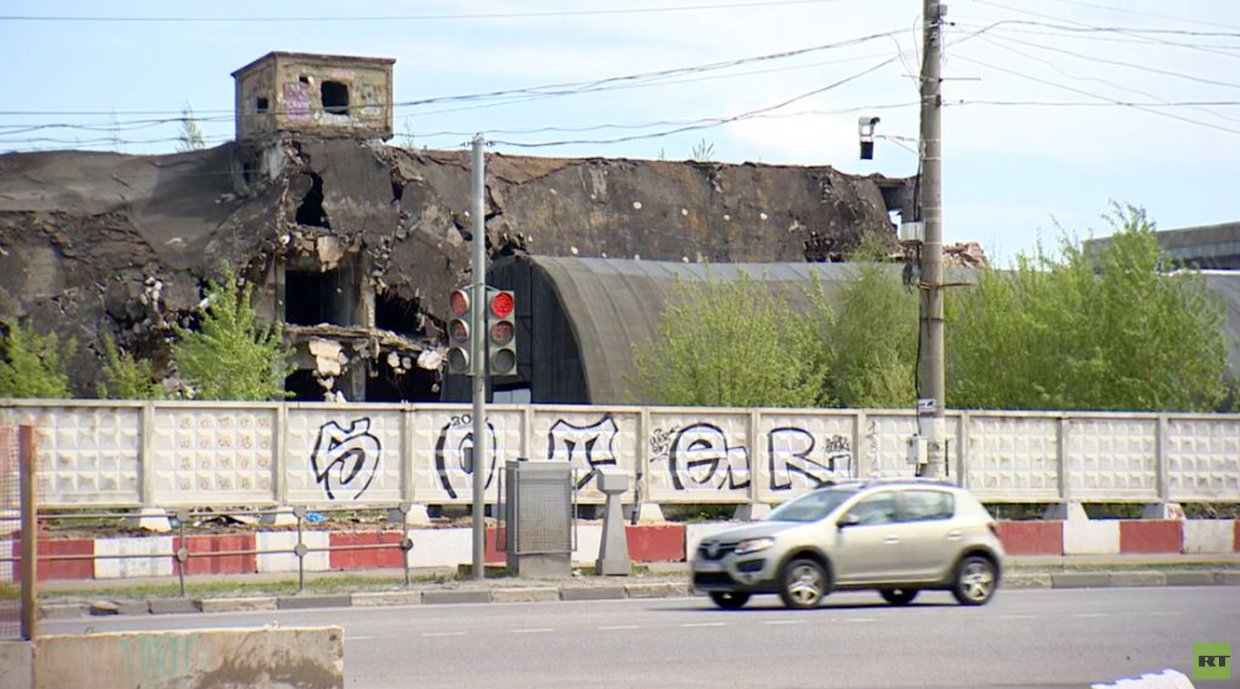
That said, only some of the 40 buildings of what used to be the plant are in total ruin; most are still standing. They are used for storage and logistics purposes, as well as housing hostels and shops. The plant’s buildings and offices located right in the center of Lyubertsy became the lawful property of Adolf Gast in 2000. The new owner, however, has apparently decided not to formalize his use of the land.
“There was no lease agreement ever signed for this land,” Deputy Mayor of Lyubertsy Andrey Syrov told RT. “Because of this, Gast’s foreign firms don’t pay the town anything for the use of the land under the buildings. The owner himself hasn’t been seen in Russia since 2004.”
No Tax Burden?
According to a document made available to RT, the Lyubertsy government has been trying to recover a land lease debt of 826 million rubles since early 2014. However, most firms that rent out offices and spaces located on the plant’s premises are registered abroad - in Bulgaria, the UK, and Cyprus - and are in no hurry to comply with Russian court orders.
Companies House, the UK’s registrar of businesses, lists at least three of them – Cobard LTD, Bluemery Industries LP and D-Vert Solutions LTD – as controlled by Gast personally.
In 2021 alone, Russian commercial courts have passed 10 rulings demanding that foreign companies, including Cobard LTD and Bluemery Industries, pay back the lease debt.
Lyubertsy’s authorities believe that Gast has been running this illegal scheme to avoid lease payments. As RT found out, two investigations have already been initiated against his business pursuant to Chapter 4 Article 159 of the Russian Criminal Code, which deals with large-scale fraud. One of the probes is being conducted by the Main Investigative Department of the Investigative Committee for Moscow Region.
The 2000s Scam
According to RT’s source in the local police, Lyubertsy’s budget bleeds tens of millions of rubles every year because of Gast’s schemes to transfer the money abroad. The idea is simple, insiders say – to avoid paying for the land, the businessman signs new legal ownership deals for the buildings over and over again and constantly renews the tenant contracts.
“As soon as a firm is hit with a lawsuit, the property gets sold to a new owner. The previous owner, now liable under a Russian court ruling, becomes defunct, and so, the prosecution has to go back to square one and do all the work over again every time,” RT’s source added.
Talking to RT, Lyubertsy Mayor Vladimir Ruzhitsky confirmed that Gast has successfully evaded all the orders issued by Russian commercial courts.
“We’ve held over 100 court hearings. Every time we win a lawsuit against Adolf Gast’s firms and the court orders them to pay back the debt, they just resell the buildings to new third parties. The situation is rather complicated because he owns the property, while the land is owned by the town,” Ruzhitsky told RT.
A major breakthrough has since come with the local administration’s legal team finally getting a court ban on any ownership transfer activities for all the main buildings. Now, nine pieces of property are under arrest, while the other 31 cannot be sold or rented out long-term. The authorities maintain that it was necessary to prevent Gast’s firms from reselling the buildings yet again.
However, thanks to what officials see as a cunning trick, these measures have been deftly evaded. While the property was under arrest, its Swiss owner apparently managed to continue renting it out using different front companies. This time, he managed to sign tenant deals with about 40 tenants in Russia. After that, he reportedly went on to sublet the premises in their names to third parties for a period not exceeding 11 months, which is allowed by Russian law in cases when the property is under a court arrest. The situation with these subtenants has grown intense. They do not wish to vacate the premises because they received cut-price deals on their subrent contracts.
“Many of the subtenants refuse to leave. They claim they have invested millions into repairing and upgrading the properties,” Syrov explained.
Plant versus people
According to the deputy mayor, the situation is getting worse by the year. Every month, new violations of construction and fire safety regulations, as well as migration laws, are identified on the territory of the former plant.
RT has obtained evidence that these safety breaches, unauthorized renovation activities, and illegal use of the premises in need of demolition are among the illegal activities that put people’s health and lives in real danger here.
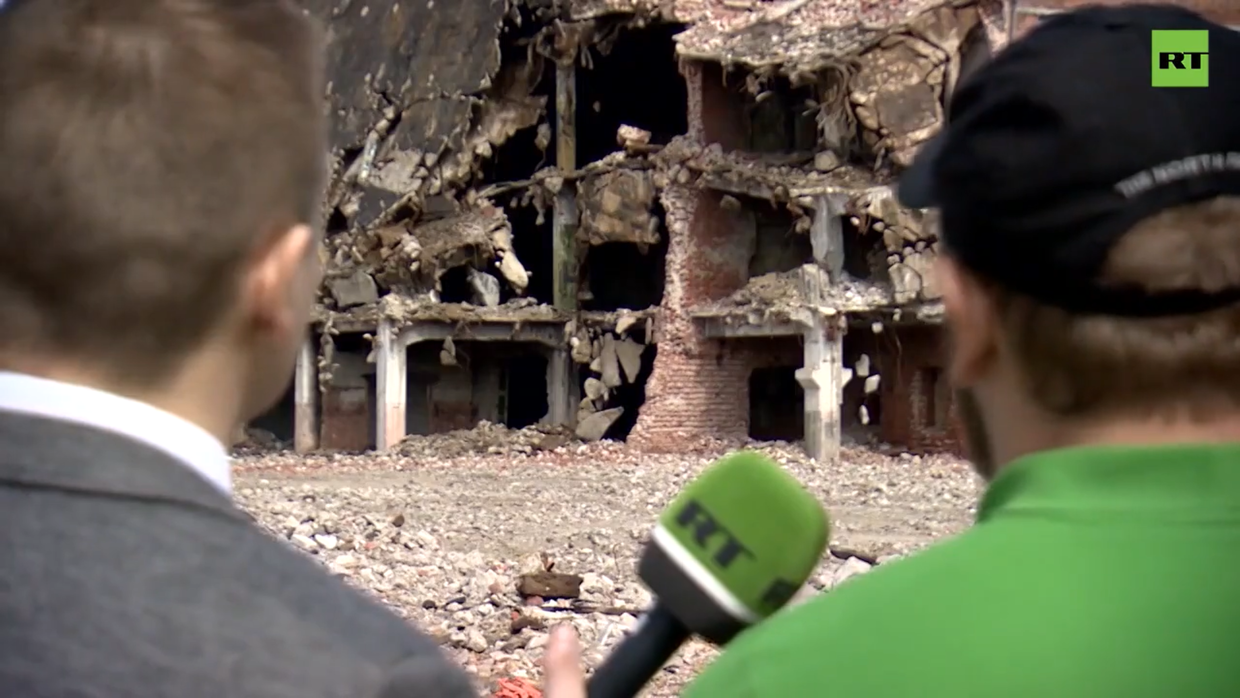
The town administration’s lawyers have submitted official appeals to the relevant overseeing agencies. RT has obtained one of them, an appeal made to the head of the Emergencies Ministry’s Moscow Region Division.
The document reveals that Lyubertsy’s own division of the Emergencies Ministry has been unable to perform an emergency on-site check involving the properties’ owners. The fire safety supervision officials explained that they failed to inform the property owners 24 hours before the check as per the law requirement because all the owners were firms registered abroad. With the borders closed down, no mail made its way in time to the UK or Northern Ireland, the Emergencies Ministry representatives added.
However, the officials were still able to pin down some violations of fire safety rules in the hostels run on the plant’s premises. Five subtenants were fined, but not the real owner.
“We would hate to see anything like the Zimnyaya Vishnya mall fire happen here,” the deputy mayor said, referencing a blaze which took the lives of 60 people, including 37 children. “The place is full of people. There are hostels here, they’re always full. A fire could lead to a disaster.”
Toothless Justice?
In December, the Tenth Commercial Appeal Court ruled that C Property Corporation, one of the property co-owning firms set up by Gast, must take down a building it built without a legal permit on the plant’s territory. To date, the firm has reportedly not complied with the court’s order.
And this isn’t the first time the complex has defied magistrates. Back in2014, a co-owner was ordered by a court to take down a building that was ruled to be a threat to people’s health and lives due to its dilapidated state. In order to avoid having to comply, the legal owner, also a firm owned by Gast, simply dissolved itself.
Even the involvement of federal agencies on the international level didn’t help solve the problem. The Russian Ministry of Justice and the Foreign Ministry issued a plea to the government of Cyprus to enforce the ruling of the commercial court made in regard to one of the overseas companies. Nothing has been done.
In 2020, when the municipal authorities eventually started taking down the buildings themselves, using local budget funds, a full-scale war was started against them.
As the Lyubertsy administration’s deputy head told RT, a squad of thugs attacked the trucks and machines operated by the firm that was commissioned by the municipal authorities to take down the buildings. A Molotov cocktail was hurled at one of the excavators, while another one had its roof fractured by bricks thrown by the attackers. The gang also used trucks to remove the fencing around the site installed by the administration.
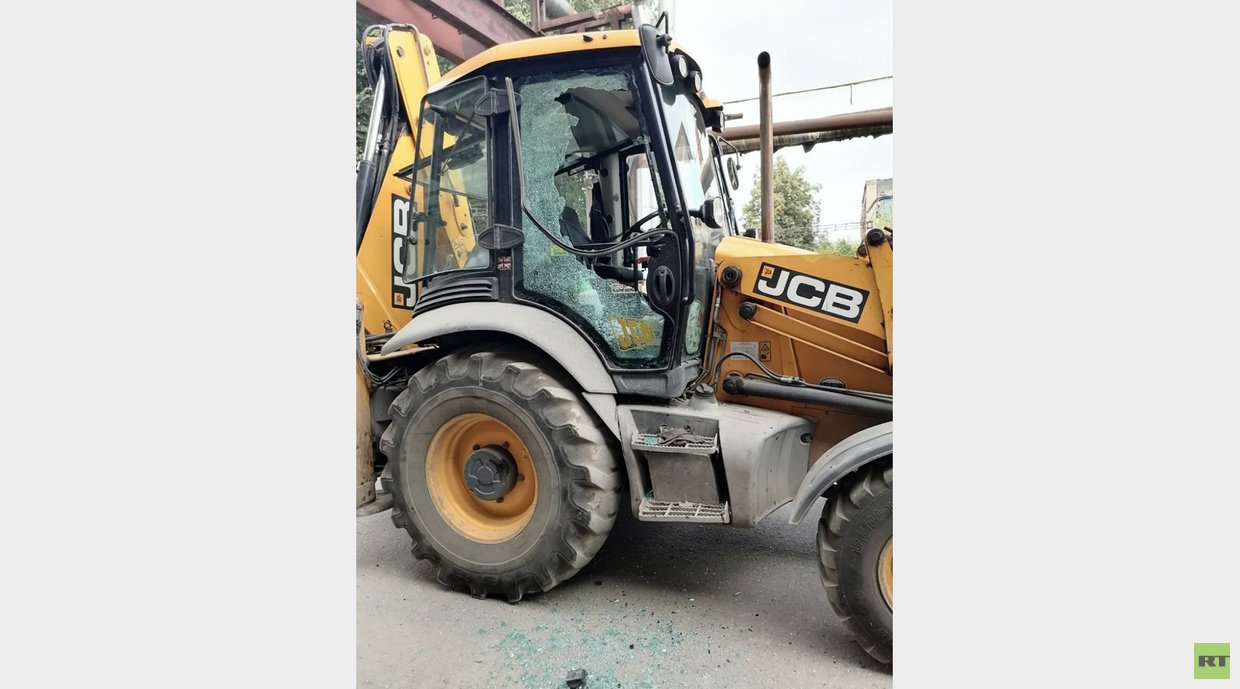
“They set a tractor on fire. Hurled bottles filled with a flammable substance at it. Employees from the company that helped us demolish the buildings said [the machinery] was leased. The losses amounted to 5 million rubles,” Syrov said.
– Are you aware that what you are doing is illegal? This fence has been installed by the local administration.
– Ask those guys over there. I don’t care.
A drug den near the WWII Eternal Flame
The shantytown-like machinery plant has a bad name among Lyubertsy residents for housing scores of overnight shelters and cheap hostels for undocumented migrants. One photo, shared online, shows an illegal shelter located in one of the factory buildings. In the picture, a scantily-clad woman in stockings poses against the backdrop of the factory buildings in the distance.
The den is located close to a World War II monument and the Hero of the Soviet Union Yuri Gagarin vocational school, where the world’s first cosmonaut studied between 1949 and 1951.
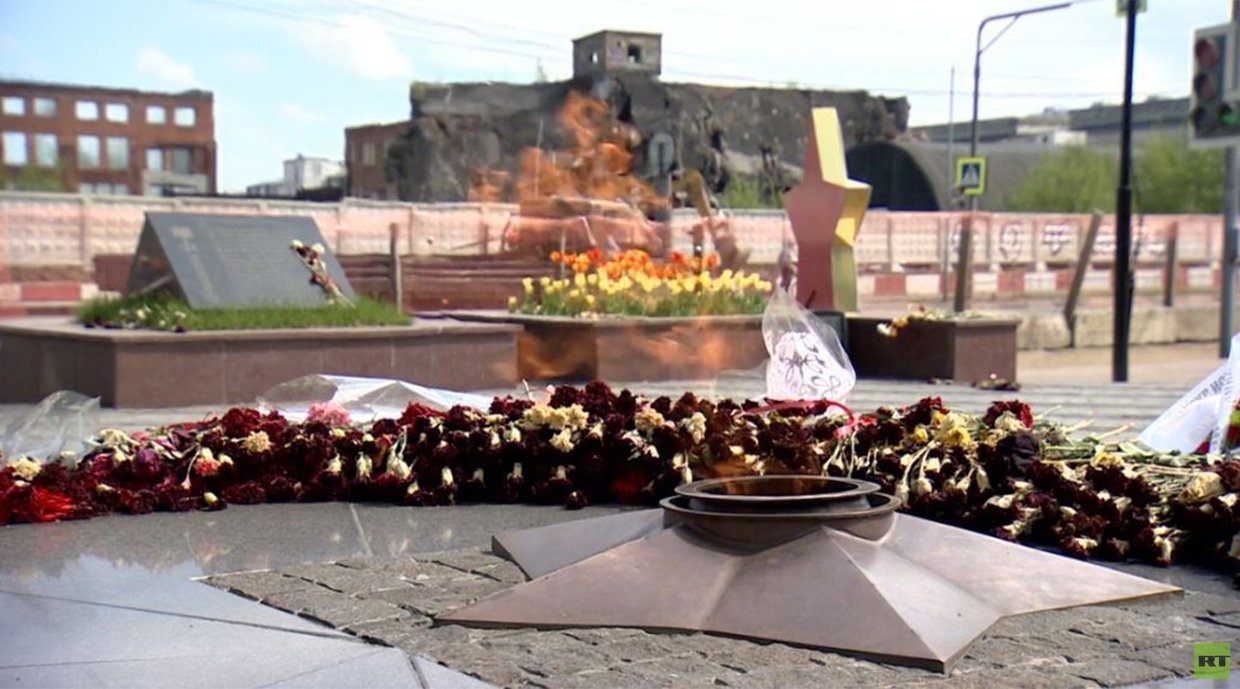
The town’s administration has been receiving numerous letters from local residents, crying out for help, asking to remedy the situation. They are not happy with “camouflage-dressed migrants” inhabiting non-residential premises in the center of the town. They are also concerned that the half-ruined, nearly crumbling buildings pose a threat to people’s safety.
Last year, the administration succeeded in closing a drug store located on the premises that they said was illegally selling narcotic drugs. Before the ill-famed pharmacy was closed, it used to attract hordes of local drug addicts forming long lines in front of the building.
Intruders on Victory Street
“They shot a film about World War II here. No set design was needed,” a volunteer from a local neighborhood watch group, Evgeny S., told RT. The man is part of the informal team that set out to protect public order on the premises of Ukhtomka, as the plant is called by locals.
Evgeny waves at the surrounding landscape – dilapidated buildings, construction debris, and waste.
The history of confrontation between the site owners and Lyubertsy’s administration resembles a real battlefront dispatch. The price for taking down two of the crumbling buildings was a burnt tractor. And then when the administration was about to resume its activities on the premises, they faced even fiercer opposition. Evgeny said that his vigilante unit was attacked with stones and brick rubble thrown at them from the rooftops.
“When we tried to take down the adjacent building, they got two people inside to stay at the windows and block the way for demolition machinery,” Evgeny told the RT crew.
While we are still talking to Evgeny, an old and battered Hyundai Porter truck drives past us. Then it stops not far away, turns around, and heads towards the TV crew and vigilantes standing together. At the last moment, the truck swerves and the two men in the front seats stare at our group.
“That’s the truck that rammed our vehicles.” Evgeny’s eyes follow the Hyundai truck as it drives off.
Evgeny’s fellow vigilantes told us that the grey Porter had repeatedly attacked their vehicles in the past. Each time the truck would swing around and reverse towards the group’s cars, which were parked on the premises, ramming into them. When the traffic police arrived, the driver would simply tell them he had lost control of his vehicle. The vigilantes recalled four similar car-ramming attacks in just one year and showed photos and videos from the incidents to RT.
The head of Russia’s Committee for Car Owners’ Rights Protection, Georgy Kholmansky, believes that the actions of the Hyundai truck driver can be qualified as willful damage of property.
“The offender responsible for the car accidents can be charged with willful destruction or damage of property pursuant to Article 167 of the Criminal Code of the Russian Federation. I don’t see any problem here,” the lawyer told RT. “The deliberate nature of the offense can be confirmed by the fact that the man behind the truck’s wheel has rammed the parked cars systematically, on a number of occasions.”
Businessman or criminal mastermind?
How the criminal cases initiated on charges of fraud and theft of public funds from the Lyubertsy budget might fare is still unclear.
Each of the experts RT has talked to so far have different views on the best way to hold Gast accountable. The head of Your Legal Representative, a Russian bar association, Konstantin Trapaidze, said that the problem was not merely one of interpretation of the law, but could involve corruption and dodgy dealings.
“It is strange that the injunction prohibiting resale and long-term lease of the buildings was only introduced 10 years after the first case of missed payments. This could mean that some public officials have a vested interest, possibly along the line of agencies and organizations in this relationship,” Trapaidze told RT.
According to Stanislav Smolentsev, a commercial litigation lawyer, Russian law enforcement has good chances of holding the ultimate owner of the buildings, Gast, responsible – all they need to do is prove that he has played the leading part in this scheme.
“It’s really possible to prove the guilt of the person who virtually pulls the strings in such a case. And his Swiss citizenship won’t be an obstacle,” the lawyer said. “Extradition from Switzerland to Russia is possible, as stipulated by the European Convention on Extradition.”
In his interview with RT, Mayor Ruzhitsky said the current situation on the plant premises is a major concern for almost every local resident.
“Local residents are very emotional when it comes to the Ukhtomsky plant – they think that the municipal government won’t do anything as they are in cahoots with the owner. They think this appalling situation is the result of the government turning a blind eye to the problem.”
The mayor believes that the problem can only be solved if the defense team and law enforcement agencies join their efforts.
“Today, this type of case is dealt with by the local offices of the prosecutor and prosecutor general, as well as the regional and federal investigative committees. I hope that Russia’s law enforcement agencies will take measures to sort out this mess,” he said.
Ruzhitsky also pointed out that the newly adopted general plan of the town does not provide for warehouses and logistics facilities to be located in the central part of Lyubertsy.
“This area will be turned into a public space – schools, child daycare facilities, green alleys and a business area will be built. Once we have resolved all the issues related to this area with its owner, we’ll be able to finally focus on the development plans for this part of the town. And it’s in the downtown of Lyubertsy,” the mayor said.
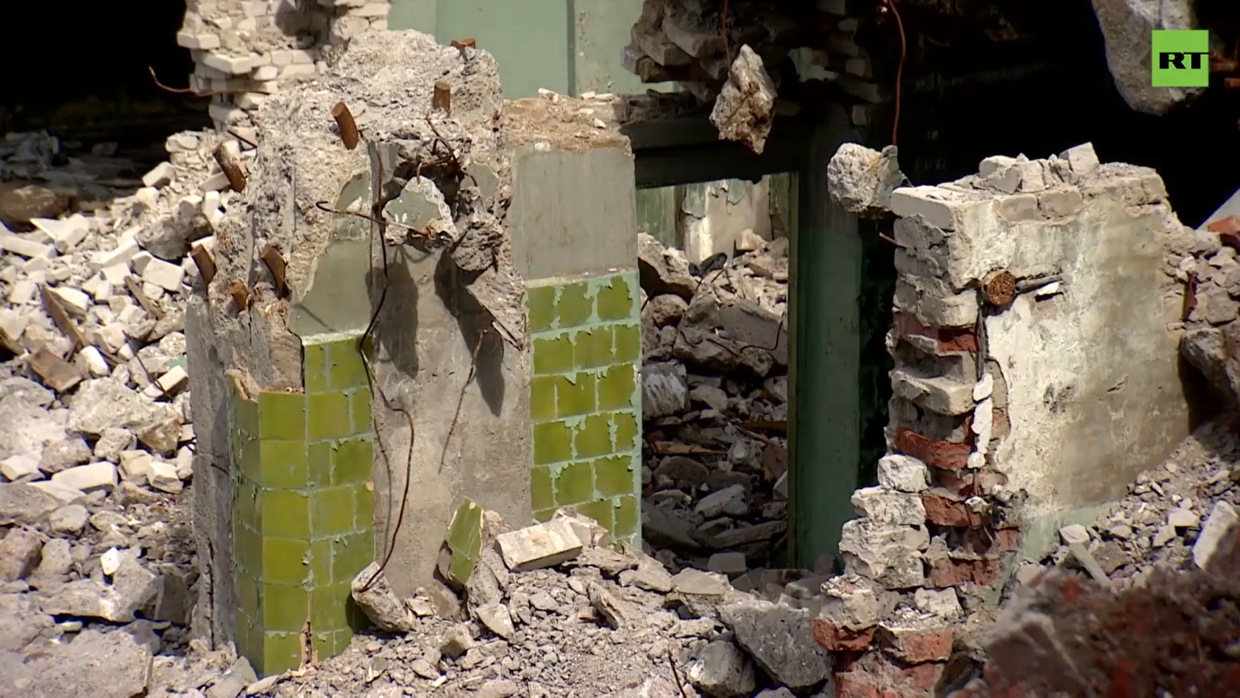
The demise of a factory with history
The A. V. Ukhtomsky Agricultural Machinery Plant was founded in 1902. Around 15,000 people were employed here during the Soviet era.
During World War II, the plant produced shells. It received the Order of the Red Banner of Labour for supplying over 20 million mines to the frontline, and then the Order of Lenin, too.
Back in the 1950s, Yuri Gagarin, who later became the world’s first cosmonaut, worked here as part of his on-the-job training in his teens. He studied foundry practice at the technical college affiliated with the plant.
In the 1960s, the plant assembled agricultural machinery for Cuba. Cuban leader Fidel Castro is said to have personally come here to inspect the production line during his official visit to the Soviet Union in July 1972.
After 1992, the plant was privatized and by 2000 had become bankrupt. That’s when Gast bought it out, bringing about the current saga.
Like this story? Share it with a friend!
